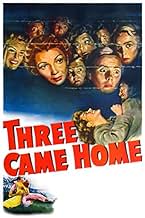Aggiungi una trama nella tua linguaDuring Word War II, American author Agnes Newton Keith is imprisoned by the Japanese in various POW camps in North Borneo and Sarawak.During Word War II, American author Agnes Newton Keith is imprisoned by the Japanese in various POW camps in North Borneo and Sarawak.During Word War II, American author Agnes Newton Keith is imprisoned by the Japanese in various POW camps in North Borneo and Sarawak.
- Premi
- 1 vittoria
- Elderly Resident
- (non citato nei titoli originali)
- English Girl
- (non citato nei titoli originali)
- English Radio Announcer
- (non citato nei titoli originali)
- English Radio Announcer
- (non citato nei titoli originali)
- Japanese Soldier
- (non citato nei titoli originali)
- Woman Prisoner
- (non citato nei titoli originali)
- Englishman
- (non citato nei titoli originali)
- Dr. Bandy
- (non citato nei titoli originali)
- Japanese Soldier
- (non citato nei titoli originali)
Trama
Lo sapevi?
- QuizAgnes Newton Keith, the writer of the book on which this film was based, wrote a letter about the film and its critical response. The letter was published in 'The New York Times' on 26 March 1950. It reads: "...I find that one or two critics (not 'The New York Times') question why the story was written....I wrote 'Three Came Home' for three reasons: For horror of war. I want others to shudder with me at it. For affection of my husband. When war nearly killed me, knowledge of our love kept me alive. And for a reminder to my son. I fought one war for him in prison camp. He survives because of me....The Japanese in 'Three Came Home' are as war made them, not as God did, and the same is true of the rest of us."
- BlooperColonel Suga says he attended the University of Washington for four years and Agnes reveals that she attended Berkeley. Suga goes on to say that Cal "murdered" Washington's football team. However, Tatsugi Suga arrived at Washington in 1924 and during the next four seasons California never defeated Washington. Only one football game would fit Suga's description: a 33-0 loss in 1933.
- Citazioni
[first lines]
Agnes Newton Keith: Six-degrees north of the Equator, in the heart of the East Indies, lies Sandakan, the tiny capital of British North Borneo. In Sandakan in 1941, there were 15 thousand Asiatics, 79 Europeans, and 1 American. I was the American. My name is Agnes Keith. I was born in Oak Park, Illinois, and graduated from the University of California at Berkeley. My husband is Harry Keith, a colonial official of British North Borneo. Borneo became my home when Harry and I were married. And it was in Sandakan that I bore one child, and lost another. And it was in Sandakan that we waited - 45 white men, 24 wives, and 11 children - through the anxious days of 1940 and '41. Certain only of one thing: that sooner or later, Japanese guns would join in the thunders of war, and Japanese troops would come down through the East Indies. The men waited because it was their duty; the women because it was their choice.
- ConnessioniEdited into Your Afternoon Movie: Three Came Home (2023)
- Colonne sonoreYou Say the Sweetest Things (Baby)
(uncredited)
Music by Harry Warren
Played on the radio before and after the news flash regarding Pearl Harbor
On the screen and in real life Keith was a novelist who faithfully recorded oriental life with some empathy in her books. That got her some favorable treatment from the Japanese, in the film in the form of an ally of sorts in a colonel played by Sessue Hayakawa.
Hayakawa's performance is the highlight of the film. It may very well have been the first time post World War II that a Japanese character was given three dimensions. Of course the brutality of the Japanese prison camps is also shown in the best tradition of that other World War II film Sessue Hayakawa did, The Bridge On The River Kwai.
1950 was definitely the year for women in stir. A few weeks before this film came out, MGM released Caged which certainly has some of the same themes as Three Came Home. Of course the big difference is that over at MGM the women were criminals in a civilian setting.
Three Came Home directed by Jean Negulesco who normally did lighter material than this, holds up very well for today's audience. Colbert, Knowles, and Hayakawa do some of their best screen work here and definitely try to catch this one when broadcast.
- bkoganbing
- 6 ott 2008
- Permalink
I più visti
- How long is Three Came Home?Powered by Alexa
Dettagli
Botteghino
- Lordo Stati Uniti e Canada
- 1.900.000 USD
- Tempo di esecuzione1 ora 46 minuti
- Colore
- Proporzioni
- 1.37 : 1
Contribuisci a questa pagina






























